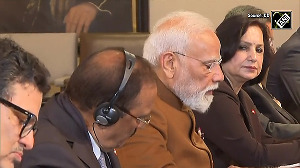With an increasing number of women joining the workforce, the issue of harassment in the workplace is also on the rise. However, it is still a little understood subject and the thin line between casual misbehaviour and sexual harassment often disappears. Jayalakshmi Sengupta reports.
The news that a venerated publisher was accused of sexual harassment by a female co-worker and subsequently resigned from an overseas posting in Canada has shocked both readers and the publishing fraternity in India. While the air is yet to be cleared on whether it was a onetime aberration by an individual with an otherwise impeccable track record, or there is something more to it, the unfortunate incident brings into focus the fact that sexual harassment of women at the workplace is on the rise today and yet is a largely ignored subject. Some get reported, but most get hushed up, and very few ever get redressed.
A common trend is to suspend the victim to dilute the gravity of the situation. As a result, fewer instances get reported for fear of adverse reactions from the establishment.
In 2008, airhostess Amrita Ahluwalia was grounded and the Indian Commercial Pilots Association allegedly asked its 600 pilots to decline flying with her because she levelled charges of sexual harassment against a senior pilot.
Earlier this month, a woman executive was suspended from a private Hindi channel in the Capital after she alleged sexual harassment by her colleagues.
And recently, a distraught BJP female member confided that her Congress colleagues had made certain 'objectionable remarks' about her, but the incident ruffled a few feathers before settling down into placid silence. Even while Sushma Swaraj rushed out to console her party MLA, the matter seemed too trivial for any stringent action. "It was innocuous and harmless," the male colleagues defended. "Why was it being blown out of proportion?" some retorted. "Double-meaning remarks have been made in the House against other women members before. It is no big deal," was the most surprising rejoinder from a fellow female colleague, MLA Kalpana Parulekar. The contention seemed to insinuate that women are congenitally insecure and need to equip themselves to handle workplace pressures.
Clearly, covert and subtle workplace harassments are indeed endemic today. At the same time, people in general do not seem to have a clear idea of what constitutes unacceptable behaviour and do not know how to address them systematically.
"One must learn to put up with some amount of nonsense," is a depressing refrain among a substantially large percentage of working women. Female colleagues playing the devil's advocate, instead of coming together as a team to handle such covert and obvert harassment, make things worse.
"That is because the workplace is still looked upon as a man's domain, into which women have intruded and must therefore put up with certain inconveniences," says Martha Farell, social activist and director of Society for Participatory Research in Asia (PRIA), an NGO.
"Being a woman, however, does not necessarily make one more gender-sensitive than a man," she reminds. "Women too lack proper information on what constitutes sexual harassment, the causes of sexual harassment and supposed provocation."
Controversies around such harassment issues tend to attach a certain stigma to the woman's reputation that one generally wants to avoid. To take a moral high ground is playing it safe. Divided in their perception and ideas on harassment, reported instances fail to create the repercussion as expected from a complainant's own sex, diluting the issue of gender harassment.
While there is always a possibility that such charges, in some cases, could be a ploy to vindicate or settle personal issues, "It is unlikely that a woman would put her dignity at stake to claim redress, given the social stigma she is likely to suffer forever thereafter," say activists working with issues on harassment.
"Why blame only the men?" asks David I Masilamani, a designer and a disc jockey popularly known as 'Blackjack' in Secundrabad. He alludes to the modern work environment where 'favours' lead to comfort zones up the corporate ladder. A larger number of women are playing up and learning to take advantage of male attention, which goes against the gender harassment argument, he believes.
A growing concern today is the less inhibited culture of modern society. A new workplace attitude subscribing to flirtatious innuendoes as a way of life seems to be gradually taking over. Men and women are finding it increasingly difficult to draw a line between acceptable and unacceptable workplace behaviour. What looks like casual flirtation to one and is meant to be taken lightly, may seem like a serious misdemeanour to another. Ways of handling such a situation -- whether it is welcome attention or otherwise -- are also getting foggier.
'Signals' that trigger misbehaviour are not an easily identifiable matter, which makes it difficult to stem the issue by holding women responsible for generating such harassment. For instance, many men and women firmly believe that 'provocative dress' is the factor that is responsible for sexual harassment. Recently, Debrahlee Lorenzana of Puerto Rican origin alleged in a lawsuit against her employers, Citibank in New York, that she was fired because the management thought her 'provocative dressing' was 'distracting' for the clients. "But those who define what is provocative or are the ones getting 'provoked', need to understand that even a woman in a burqa, which may not be so provoking at all, could be sexually harassed," reminds Farell.
So that both men and women understand what constitutes harassment that can be punishable under law, India's Supreme Court guidelines on Sexual Harassment, declared on August 13, 1997, are very clear.
"Whether or not a particular action or behaviour constitutes sexual harassment is determined by the impact on the recipient, and is not dependent upon the intention of the perpetrator," it states categorically.
"Sexual harassment is usually a top-down thing with the vulnerable more prone to persecution," says activist Ruchira Goswami. "In a feudal society like ours, a man who is intimidated by a strong woman may further strike out to retain a sense of dominance. Belittling a man and injuring his fragile ego has often provoked gross harassment." This is true across the board in both rural and urban India. The incident of Bhanwari Devi, who was gang-raped in September, 1992 by five Thakur men because she protested child-marriage in her village, is well-known.
While rape cases are easier to testify and take cognisance of, day-to-day workplace misconduct may not be that easy to report. In urban India and its metros, creating an environment that allows for safe, well-meaning and positive work ethics that lead to better productivity, fairness and a healthy feeling of respect and comfort is a tall order, given the huge transition our society is going through.
Educating both men and women on what entails responsible workplace behaviour is the first step to reducing unhealthy workplace practices and habits, according to Masilamani. Old-fashioned values, chivalry, upbringing and comfort around the opposite sex are what men need to adhere to.
"We need proactive workplace management that keeps workplace harassment high on its agenda," says Goswami. According to her, these issues must be discussed without bias and addressed along with the workers' union on a daily basis, to induce greater responsibility among men and women and to make them conscious of what constitutes workplace misbehaviour.
The Indian judicial system is now taking a serious view of sexual harassment in the workplace, with the Cabinet set to review a draft bill pertaining to the issue next month. According to the draft, organisations may compulsorily have to set up sexual harassment complaint comittees to deal with employee complaints, failing which they will face a penalty and may even have their business licenses revoked. The draft also calls for a penalty levied against those who make false claims of harassment.
Do you think this is a step in the right direction? Have you ever been a target of workplace harassment or been falsely accused of the same? Share your opinions and experiences in this regard with us. Write in to getahead@rediff.co.in (subject line: 'Harassed at work') and we'll publish the responses right here; names will be withheld upon request.





